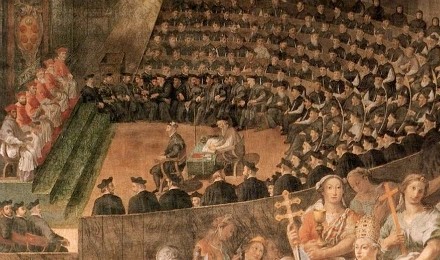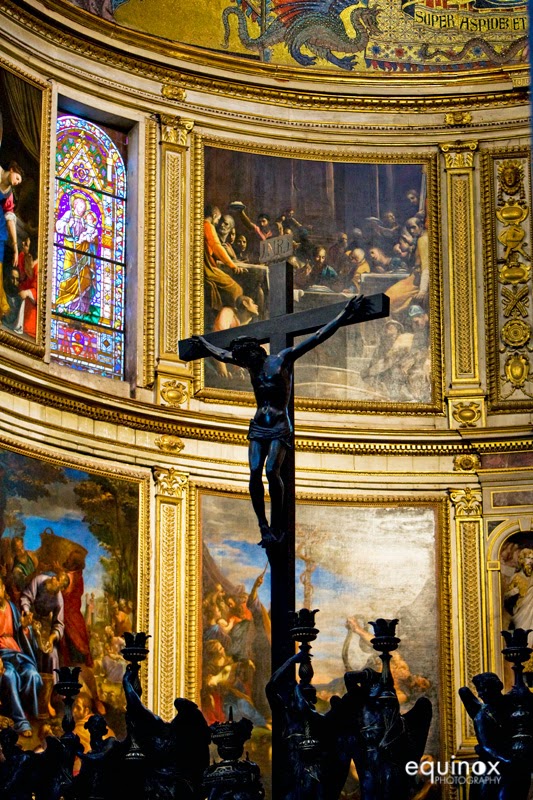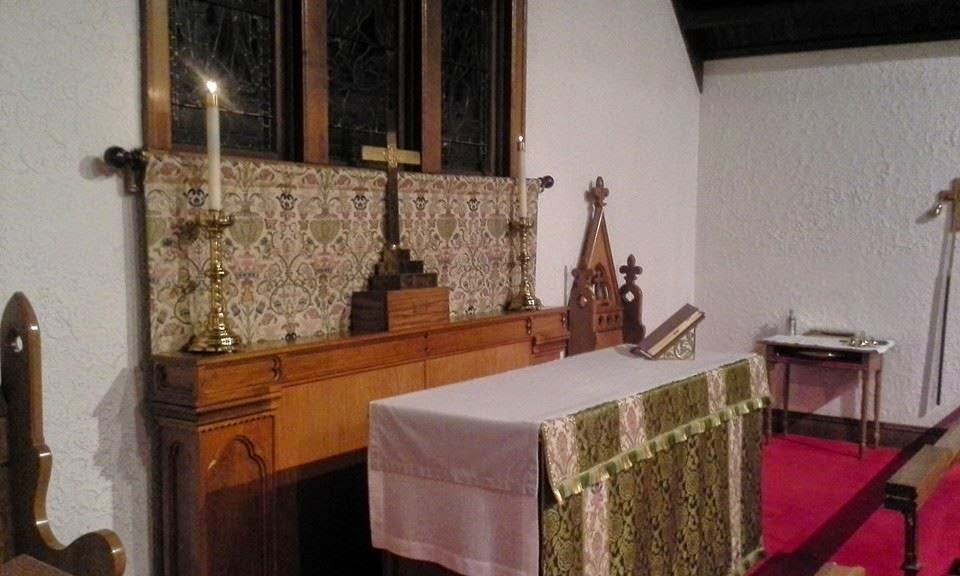 The Evangelical Stance - This stance is more of a group of related contentious questions: Why keep Jesus on the cross when he has risen and defeated death? Why dwell so much on the cross, it's only half of the story? They go on to bolster their objects by citing Exodus 20:4 (the second commandment about graven images), John 4:24 (about worshipping in spirit and in truth), and by making the claim that since the cross was adopted as the official symbol of Christianity during the reign of Constantine (which occurred some 300 years after the death of Christ) and because the Bible does not say anything about the apostles or early Christians representing their faith by displaying crosses - then we should not do so either.
The Evangelical Stance - This stance is more of a group of related contentious questions: Why keep Jesus on the cross when he has risen and defeated death? Why dwell so much on the cross, it's only half of the story? They go on to bolster their objects by citing Exodus 20:4 (the second commandment about graven images), John 4:24 (about worshipping in spirit and in truth), and by making the claim that since the cross was adopted as the official symbol of Christianity during the reign of Constantine (which occurred some 300 years after the death of Christ) and because the Bible does not say anything about the apostles or early Christians representing their faith by displaying crosses - then we should not do so either. The Counter Argument - We'll start by taking the easiest points in this evangelical stance to correct and move on from there. Firstly, when it comes to the cross being adopted as the institutional symbol of Christianity hundreds of years after the death of Christ AND not expressly mentioned as the same in the Bible, we also should not look to it as the institutional symbol for our faith. This makes little sense. Why?
The Counter Argument - We'll start by taking the easiest points in this evangelical stance to correct and move on from there. Firstly, when it comes to the cross being adopted as the institutional symbol of Christianity hundreds of years after the death of Christ AND not expressly mentioned as the same in the Bible, we also should not look to it as the institutional symbol for our faith. This makes little sense. Why?- The Bible itself is not mentioned in the Bible. A strange assertion I realize, but follow me. Before the codification of the Bible as we know it today, there was no such thing as the Word of God to follow and obey as a practicing Christian. It was not until the early Christian leaders met at the Councils of Hippo (393 A.D.) and Carthage (397 A.D.) that the Bible was canonized and even more surprisingly, there was not even the definitive list that we know today, did not come from an Ecumenical Council until the Council of Trent (1545–63).
- The concept of the Trinity, is never defined in the Bible and the exact word NEVER shows up. This belief was not officially adopted until the Council of Constantinople (360 A.D.)
- The list continues but the purpose is clear - does any Christian church discount the belief in the Trinity or the authority of the Holy Scriptures? No. Of course not. One will also note that both of these iconic examples were adopted well after 300 A.D. See what I'm saying? You can't have it both ways. That option just isn't open to us.
Now comes the answering of the contentious questions posed at the beginning - Why keep Jesus on the cross when he has risen and defeated death? Why dwell so much on the cross, it's only half of the story?
________________________________________
 If we are put into a box and can only give Christ the glory in his resurrected state (as in, without a focus on the cross), then Christmas just got a lot more boring. Because if we can only look to the resurrected Jesus, are we not allowed to worship the Jesus that was in the manger? What about the Jesus that walked on water? Or the Jesus that healed the sick? We are called to worship without ceasing (1 Thessalonians 5:16-18) - not only to worship Jesus as our Risen Savior. All worship is important at all stages, but are there some worship stages that should be more elevated than others? If you ask an evangelical they will most likely say yes - the resurrected Christ. If you ask an Episcopalian or a Catholic they would also say yes - but they would say yes to the crucified Christ. So who's yes wins out? The one with the most substantial Biblical and theological support. And those who choose the crucified Christ would be theologically more correct.
If we are put into a box and can only give Christ the glory in his resurrected state (as in, without a focus on the cross), then Christmas just got a lot more boring. Because if we can only look to the resurrected Jesus, are we not allowed to worship the Jesus that was in the manger? What about the Jesus that walked on water? Or the Jesus that healed the sick? We are called to worship without ceasing (1 Thessalonians 5:16-18) - not only to worship Jesus as our Risen Savior. All worship is important at all stages, but are there some worship stages that should be more elevated than others? If you ask an evangelical they will most likely say yes - the resurrected Christ. If you ask an Episcopalian or a Catholic they would also say yes - but they would say yes to the crucified Christ. So who's yes wins out? The one with the most substantial Biblical and theological support. And those who choose the crucified Christ would be theologically more correct.In Revelation 5:6 we see Christ in his perfected state on the throne of Heaven with one very obvious attribute as it pertains to this argument, "Then I saw a Lamb, looking as if it had been slain, standing at the center of the throne, encircled by the four living creatures and the elders." He is seen not as the resurrected Christ, but the slain Lamb.
 Looking at what the original church fathers believed - those in authority closest to Christ - can give us all the most accurate view on our Christian beliefs. We can look to Paul's writings to see what the original Christians viewed as most important (not only as far as this issue goes, but most all issues of theological importance). In Romans 6:3-8, Paul emphasizes the importance of the death and crucifixion of Christ and not his resurrection: "For we know that our old self was crucified with him so that the body ruled by sin might be done away with, that we should no longer be slaves to sin - because anyone who has died has been set free from sin. Now if we died with Christ, we believe that we will also live with him." Later, in 1 Corinthians 1:23, we hear him say that, "we preach Christ crucified" not Christ resurrected. And what is the best way to fulfill what Paul is asserting here? Through the visible presence of the cross and the crucifix. Because like a sacrament, the cross and crucifix are visible symbols of an invisible grace. Paul goes on to say that we should not, "know any thing among you, save Jesus Christ, and him crucified. (1 Corinthians 2:1-2)" When Paul writes to the Galatians, he says that they must glory only, "in the cross of our Lord Jesus Christ. (Galatians 6:14)"
Looking at what the original church fathers believed - those in authority closest to Christ - can give us all the most accurate view on our Christian beliefs. We can look to Paul's writings to see what the original Christians viewed as most important (not only as far as this issue goes, but most all issues of theological importance). In Romans 6:3-8, Paul emphasizes the importance of the death and crucifixion of Christ and not his resurrection: "For we know that our old self was crucified with him so that the body ruled by sin might be done away with, that we should no longer be slaves to sin - because anyone who has died has been set free from sin. Now if we died with Christ, we believe that we will also live with him." Later, in 1 Corinthians 1:23, we hear him say that, "we preach Christ crucified" not Christ resurrected. And what is the best way to fulfill what Paul is asserting here? Through the visible presence of the cross and the crucifix. Because like a sacrament, the cross and crucifix are visible symbols of an invisible grace. Paul goes on to say that we should not, "know any thing among you, save Jesus Christ, and him crucified. (1 Corinthians 2:1-2)" When Paul writes to the Galatians, he says that they must glory only, "in the cross of our Lord Jesus Christ. (Galatians 6:14)" It is important for me to make sure that this is understood however - I am not saying that the resurrection is in any way unimportant or not paramount to our faith . It surely is. So much so that Paul also says, "And if Christ has not been raised, your faith is futile; you are still in your sins. (1 Corinthians 15:17)" There must be a healthy balance. And how do we get that? We first must understand as the early church did, that our emphasis must first be on Christ crucified. If it is not, we can never fully understand or appreciate the resurrection - because there can be no Easter Sunday without a Good Friday. The crucifixion won us redemption and allowed us to be put back right with God as a whole. Then, through the resurrection, we receive new life in Christ - but ONLY because it was afforded to us THROUGH the crucifixion. It is a matter of both/and not either/or. It is through the Eucharist, celebrated every day throughout the world, that Calvary becomes present - with Jesus on the cross and not off it.
It is important for me to make sure that this is understood however - I am not saying that the resurrection is in any way unimportant or not paramount to our faith . It surely is. So much so that Paul also says, "And if Christ has not been raised, your faith is futile; you are still in your sins. (1 Corinthians 15:17)" There must be a healthy balance. And how do we get that? We first must understand as the early church did, that our emphasis must first be on Christ crucified. If it is not, we can never fully understand or appreciate the resurrection - because there can be no Easter Sunday without a Good Friday. The crucifixion won us redemption and allowed us to be put back right with God as a whole. Then, through the resurrection, we receive new life in Christ - but ONLY because it was afforded to us THROUGH the crucifixion. It is a matter of both/and not either/or. It is through the Eucharist, celebrated every day throughout the world, that Calvary becomes present - with Jesus on the cross and not off it. 
No comments:
Post a Comment